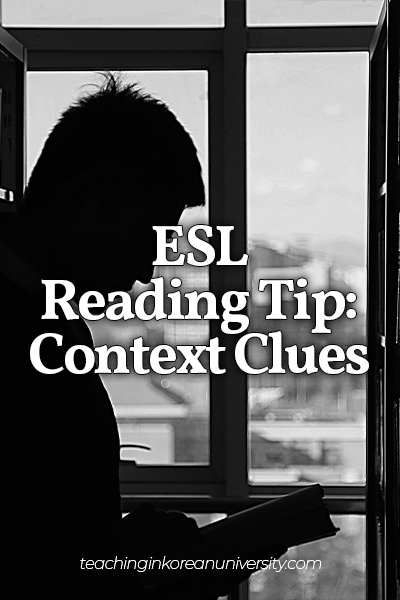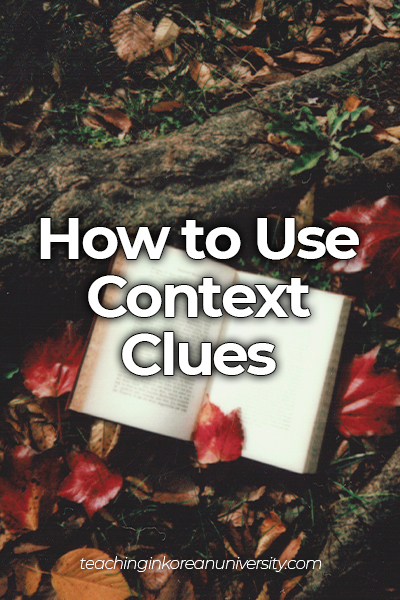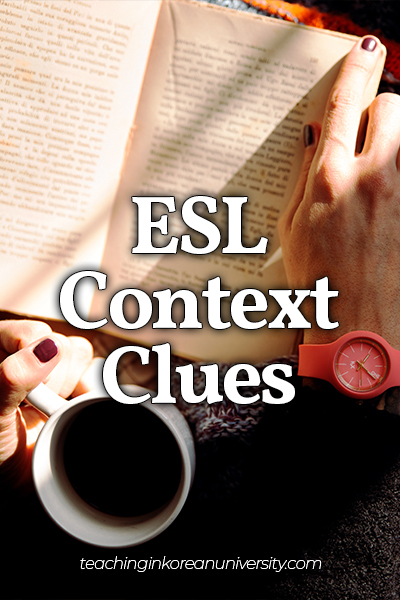Reading a text in another language is challenging. However, by learning a few tricks and tips, we can make reading easier for ESL students. One of the tips for ESL reading is using the hints provided by the text. Continue reading to learn how to use ESL context clues.

ESL Reading Tip: Context Clues
Types of Context Clues
Here’s an English Reading Tip for you about using context clues. Sure, you can use your dictionary to look up words you don’t know, but this is the easier (and better way). After all, you don’t always have a dictionary handy, especially when doing an English reading test of some kind like the TOEIC.
Context clues are hints in a text which can help you define any words you don’t know. Some common types of context clues are:
- Synonym or antonym
- Definition
- Example or description
- Contrast
- Greek and Latin roots
Use the Dictionary Fewer Times when Reading
Use these clues when you come across a word you do not know to help you with your English reading. They will not help you 100% of the time, but most of the time, these are all you need. Clearly, the main benefit of using ESL context clues is the amount of time you will save by not needing your dictionary so often.

How to Use ESL Context Clues
Here’s How to Use ESL Context Clues
So, when you see a new word, take these steps and see if you can’t figure out the definition yourself.
Finish reading the sentence. How does the word fit into the sentence? Can you guess the part of the speech?
Read the word out loud. The pronunciation may give you a clue.
Read each syllable. Up to 75% of English is based on Greek and Latin. If you see a familiar syllable, it may be a Greek or Latin prefix (beginning), root (main part), or suffix (ending). This is not always true, and a single prefix or suffix may have different meanings.
Read the sentences before and after the sentence with the new word. One (or both) may have more information about that word. The sentence after an unusual word will often have the definition or an example.
Don’t Forget About Common Sense
Use your common sense. You have reread the sentence with the unknown word and the sentences before and after it. Then you’ve read the word aloud to hear the pronunciation. You have considered the most likely part of speech. What is your best guess about the meaning of the word? You may be wrong, of course, but you will probably get close enough to be able to continue reading.
After Reading, Use your Dictionary to Check your Guesses
Make a note of the word and your guess about the meaning, and keep reading. When you have finished reading the text, look up the definition in your dictionary. Were you correct? Practice makes perfect; the more often you use context clues, the better you will get at it. And the more your English reading skills will improve. Sounds good, doesn’t it?
Need more English Reading Tips?
- Amazon Kindle Edition
- Bolen, Jackie (Author)
- English (Publication Language)
- 71 Pages - 05/02/2017 (Publication Date)
If you liked this English reading tip, then you’ll probably LOVE this book, 71 Ways to Practice English Reading: Tips for ESL/EFL Learners. This tip about using context clues is straight from that book, and there are 70 more tips just like it.
If you’re serious about improving your English reading skills, then you’ll need to start with 71 Ways to Practice English reading. What would it mean for your career or studies to be able to read fluently and easily? Maybe you’d be able to travel more confidently. Perhaps you’d be able to tackle that English novel that hasn’t been translated into your language yet. Whatever the case, improving your reading skills is a good plan!
Check out the book on Amazon today by clicking the button below. You can get the e-version for less than the price of an expensive cup of coffee. What are you waiting for?

ESL Context Clues
FAQs About ESL Context Clues for English Reading
Here are the most frequently asked questions about using ESL context clues.
What are the 5 types of context clues?
The most common types of context clues include synonym/antonym, definition, example or description, contrast, Greek and Latin roots, and punctuation.
What is the importance of context clues?
Once you are able to use context clues, you won’t have to rely on the dictionary as much as you did before. Often students will use a dictionary to look up unfamiliar words, get the definition, and forget the meaning very soon. However, using the clues force you to make an educated guess. This process help students truly learn a new word. Furthermore, students won’t have a dictionary during a test, so it is a crucial skill, especially for ESL students.
What are some helpful ESL reading activities or games?
Context Clues for English Reading: Join the Conversation
Do you have any tips or tricks for using context clues for ESL/EFL reading? Is it a reading skill that you already know how to use, or is it a skill that you have to work on? Leave a comment below and let us know what you think. We’d love to hear from you.
Also, be sure to give this article a share on Facebook, Pinterest, or Twitter. It’ll help other people looking to improve their English reading skills, like yourself find this useful resource.
Last update on 2022-06-17 / Affiliate links / Images from Amazon Product Advertising API





